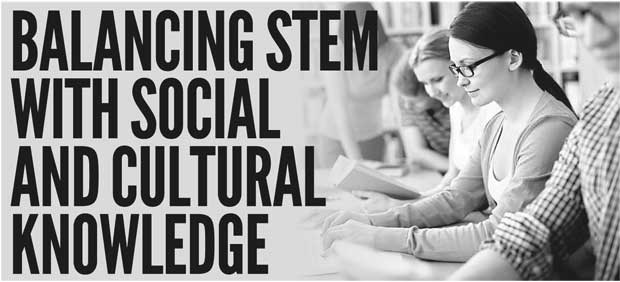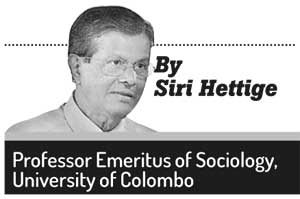Reply To:
Name - Reply Comment
Last Updated : 2024-04-25 15:57:00

 ncreasing emphasis on STEM (Science, Technology, Engineering and Mathematics) within the general and higher education systems in many parts of the world today appears to distort the leaning experience of both children and youth.
ncreasing emphasis on STEM (Science, Technology, Engineering and Mathematics) within the general and higher education systems in many parts of the world today appears to distort the leaning experience of both children and youth.
While this emphasis is understandable from the point of the prevailing severe competition among countries to get ahead in terms of technological advances, and economic development, younger generations have a right to grow up as balanced human beings. Education systems in modern societies are well placed to ensure a balanced and holistic quality education provided they are well designed with a view to achieving not just materialistic goals of technological advances and economic prosperity but also social and cultural goals such as social cohesion, sustainable life styles, inter-generational and intra-generational solidarity, peace and civic mindedness.
 Yet, increasing competition for resources, investment opportunities and expanding markets for exports persuades governments to concentrate on the development of technical expertise through education, often at the expense of humanities. As a result, a new pecking order of academic streams has emerged in many developed and developing countries. Governments, employers, educational authorities and parents want children to move up the new educational hierarchy at the top of which are STEM subjects. I.e. science, technology, engineering and maths. Traditional liberal arts subjects that tend to broaden and deepen the educational experience of children and youth by inculcating in them fundamental human values, social and cultural sensibility and intrinsic value of life, both human and animal.
Yet, increasing competition for resources, investment opportunities and expanding markets for exports persuades governments to concentrate on the development of technical expertise through education, often at the expense of humanities. As a result, a new pecking order of academic streams has emerged in many developed and developing countries. Governments, employers, educational authorities and parents want children to move up the new educational hierarchy at the top of which are STEM subjects. I.e. science, technology, engineering and maths. Traditional liberal arts subjects that tend to broaden and deepen the educational experience of children and youth by inculcating in them fundamental human values, social and cultural sensibility and intrinsic value of life, both human and animal.
More recent economic globalization guided by neo-liberalism has led to increasing competition in almost everything including education. A world economy dominated by global business interests has created employment opportunities for young people with instrumental knowledge in diverse fields like business management, accounting, new technologies, business economics, engineering, medicine, etc. Both old and new universities across the world began to offer tailor made courses in the above fields to meet the increasing demand for new skills.
Privatization of services that were hitherto managed by state institutions in many countries also created demand for functionaries to fit into new service industries and many private educational institutions began to proliferate across the world creating training opportunities for those who desired such training and had the capacity to pay for it. Mass global student mobility is the result. What is important to note here is that middle class and even lower middle class parents who wanted their children to find lucrative employment in their own countries or overseas began to persuade the latter to follow the above courses of study. As a result, conventional liberal arts education became marginalized within the general and higher education systems.
So, those who moved into liberal arts streams were placed at the lower end of the academic pecking order, both nationally and globally.
There are of course exceptions where some long established universities continue to offer high quality, often publicly funded, liberal arts courses. But the dominance of STEM in formal education at all levels is a fact.
It would be futile to argue that liberal arts education should be accorded the same level of importance as STEM education today. Given the fact that technological advancement is closely connected with economic growth in both the developed as well as the developing world, it would be virtually impossible to convince the policy makers not to emphasize the need for STEM education. What is, however necessary and urgent is to convince them that the present over-emphasis on STEM at the expense of liberal arts education is counterproductive from a wider societal perspective.
This is due to at least three important reasons. Firstly, there are no easy technical solutions to myriad of big challenges that human societies are faced with, be they climate change or worsening inter-and intra societal conflict. Secondly, understanding increasing complexity of natural and social phenomena demands inter-disciplinary synthesis that transcends traditional disciplinary boundaries separating natural and human sciences including the broad category of humanities.
And, thirdly, it is undesirable for youngsters to remain confined to a narrowly defined area of specialization with no opportunity to get acquainted with wider societal concerns that are the subject matter of disciplines coming under social sciences and humanities.
It is against the above background that there is increasing recognition among intellectuals worldwide of the need to adopt educational policies that favour integrated curricular at different levels of education. Yet, given the present trend towards atomization of educational institutions, largely driven by market forces, the promotion of holistic and integrated education has become increasingly more difficult. Today, more and more people in many countries transfer their children from public educational institutions to for profit private educational institutions and this often makes the adoption of integrated education approaches more difficult.
The nexus between education and employment is another issue that has a bearing on the key issue dealt with in this article. As is well known, private sector employers who set the standards in the employment market today look for people with certain specialized skills. Those with a broad, liberal arts education who do not have such skills usually fail to live up to employer’s expectations and remain disillusioned for years without remunerative work. This situation demotivates youth to pursue liberal arts education. So, many of those who are enrolled in such course have often ended up there due to lack of any choice. This naturally lowers the quality of liberal arts education, both in terms of teaching and learning. Moreover, those with liberal arts qualifications often end up at the bottom of the occupational hierarchy, earning much less than their counterparts in more technically and scientifically oriented fields. As is well known, morale among students following liberal arts courses in our universities is very low and they often show little interest in their education.
The developments outlined above deserve the attention of policy makers and educational administrators everywhere. The widening gap between STEM and humanities streams needs to be bridged because both streams need to be developed and made use of to understand and address increasingly complex problems that we face today. Societies today need not just technicians to fix various problems but intellectuals who can enlighten us all.

Add comment
Comments will be edited (grammar, spelling and slang) and authorized at the discretion of Daily Mirror online. The website also has the right not to publish selected comments.
Reply To:
Name - Reply Comment
US authorities are currently reviewing the manifest of every cargo aboard MV
On March 26, a couple arriving from Thailand was arrested with 88 live animal
According to villagers from Naula-Moragolla out of 105 families 80 can afford
Is the situation in Sri Lanka so grim that locals harbour hope that they coul